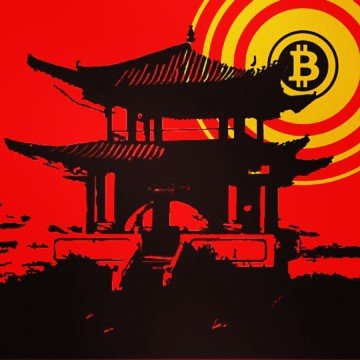
The increased intensity of Bitcoin mining power in China continues to grow concerns in the Bitcoin community. A freshly produced TechCrunch video, based on Nathaniel Popper’s book, Digital Gold, offers an overview of Bitcoin mining, containing footage from within a Chinese mine. Numerous leading Bitcoin executives offer their views on the subject. The video is titled, “Mines and Miners, Truth Disrupted: Bitcoin and the Blockchain.” When Bitcoin began, miners were the “fanatics” who had fallen in love with Bitcoin, remarked Popper. But over a short period of time, mining has become a specialised field accessible to those who have the capability to set up mining centres.
“That’s become something of a predicament because the design of the Bitcoin software provides decision-making power to the miners,” he said. “These miners from around the world have a kind of voting power over the Bitcoin software and what bitcoin itself seems like.” Bobby Lee, CEO of BTCC, a Shanghai Bitcoin mining and exchange company, revealed that Bitcoin’s founder, the eponymous Satoshi Nakamoto, saw mining as a means to grant new Bitcoins in a reasonable manner. “The only fair way he came up with was to give it for free to whoever wants it,” Lee said. Gavin Andresen, the principal scientist at the Bitcoin Foundation, described how miners create Bitcoin blocks and rush to produce the approved record of Bitcoin transactions in exchange for being rewarded newly mined Bitcoins. As the price of Bitcoin rises, it incentivizes a miner to set-up their mining equipment, said Dave Carlson, founder of MegaBigPower Bitcoin and Ether Mining, which is based in the United States.
Miners return less bitcoin over time, he said, but the price of each Bitcoin rises. Popper maintained the industry has touched a point where the deciding factors in who can profitably mine bitcoin is access to inexpensive computer hardware, and access to low-cost electricity. “Right now, the area where those two things are obvious to find are China,” he said, noting that two-thirds to three-quarters of all Bitcoins mined originate from mining establishments around China. Then shown were the inside of a Chinese mine, including employees being fed their daily meals and recreational games. Zhu Rei, CEO of an unnamed Chinese mine “somewhere in Szechuan Province,” saw there is fifteen staff who reside and work at her mining plant. Their principal job is to maintain the hardware. The video shows shelves loaded with mining computers that the workers control. The geographical regions with the cheapest rates are in rural areas, Rei noted. She continued that the number of people working in these mines is expanding rapidly. Carlson suggested the possibility that somebody could choose that bitcoins mined in the U.S. should not be admitted into any of the Bitcoin blocks in China.
Charley Cooper, managing director at R3 Blockchain Consortium, said there should be some anxiety regarding China’s growing influence over Bitcoin mining. “What do you take from a situation where one singular entity or crowd of entities acting collectively obtain enough power in an open system that they can start dictating the governance of that open platform?” Cooper asked.
One of the chief ideas was that people working together could create a greater system than anyone start-up or organiser could. “This was the idea of collective wisdom,” Popper said. “It’s not at all clear that that software being grown by volunteers from all around the world is going to be capable of adapting quickly enough to keep up with the existing power and all the means that they have to put into this experiment.”
Our Opinion
It is unlikely that the Chinese government would clamp down on Bitcoin mining, however, given the high percentage of miners being based in large Chinese mining operations it is something we would be concerned about.
We found that mining in Iceland was not only cheaper than China, it was also cleaner energy. We are looking for alternative means of electricity not just because it’s greener but because we are finding even cheaper places and the savings can be passed onto the customers and it also creates a more decentralised network for mining Bitcoin rather than having all our eggs in one basket.
We will be showing our plans for our Bitcoin Hosting services very soon and would love to hear from people looking to host their existing hardware or from people who have any questions, ideas or suggestions.
This post has been linked to from another place on Steem.
Learn more about and upvote to support linkback bot v0.5. Flag this comment if you don't want the bot to continue posting linkbacks for your posts.
Built by @ontofractal
Very insightful. I can't see the Chinese colluding to vandalize bitcoin, though, as that would gut the price, leaving them unable to service the debt on their equipment.
Also, welcome aboard, I'm proud to be your first follower :)
Of course, the Chinese miners wouldn't but the Chinese government would consider a clampdown if Bitcoin were to cause too much disruption against the Yaun. I don't feel it is likely at the moment but it's certainly a possibility in the future and with such a high level of concentration of mining power in one place its worrying. Wow I love steemit, never had such quick interation before :-) Not even a member for one hour! Cheers Matt :-)
It really is a tremendous platform. Having the Chinese miners drop out wouldn't be a big issue though (although there'd be some very full blocks for a few weeks and many happy Western miners) the concern would be if they were forced to hard fork at gunpoint; how likely would that be?
very unlikely but an interesting thought ;-)
The Chinese are the largest user of Bitcoin.You will just have get used to not being in charge of everything .It is a new world that we now live in.